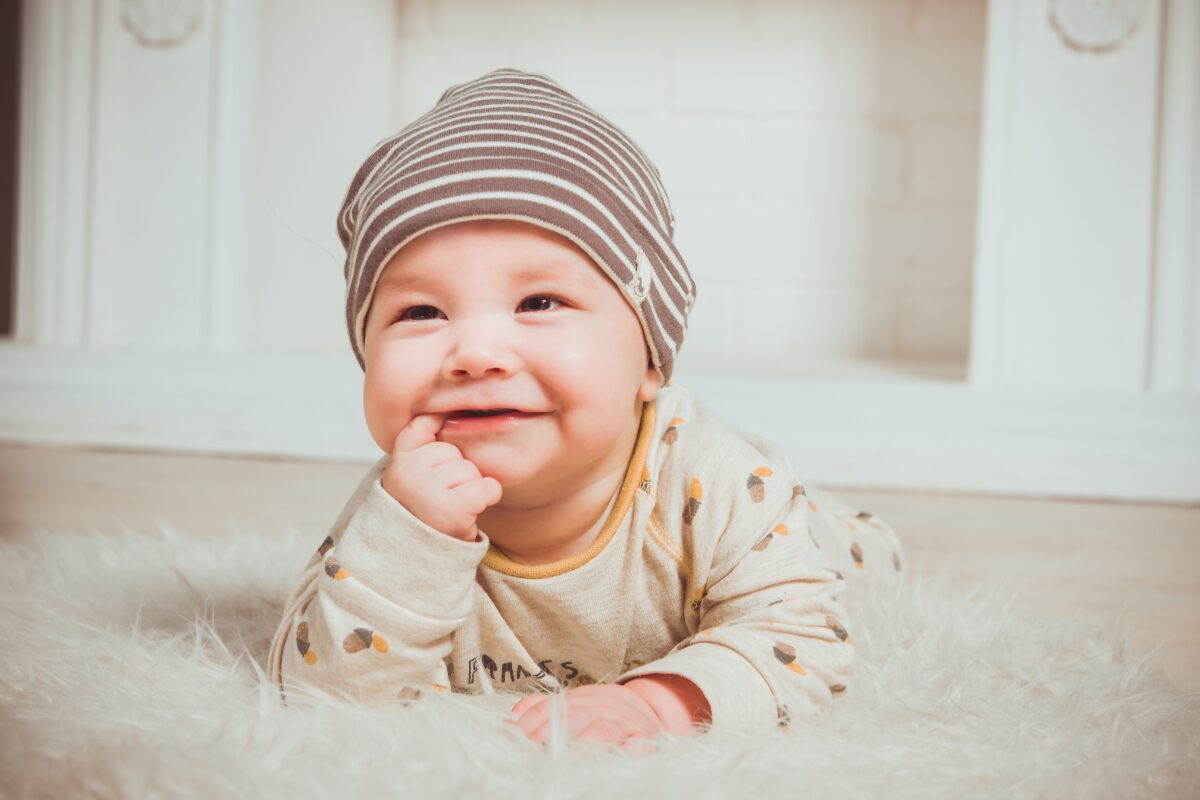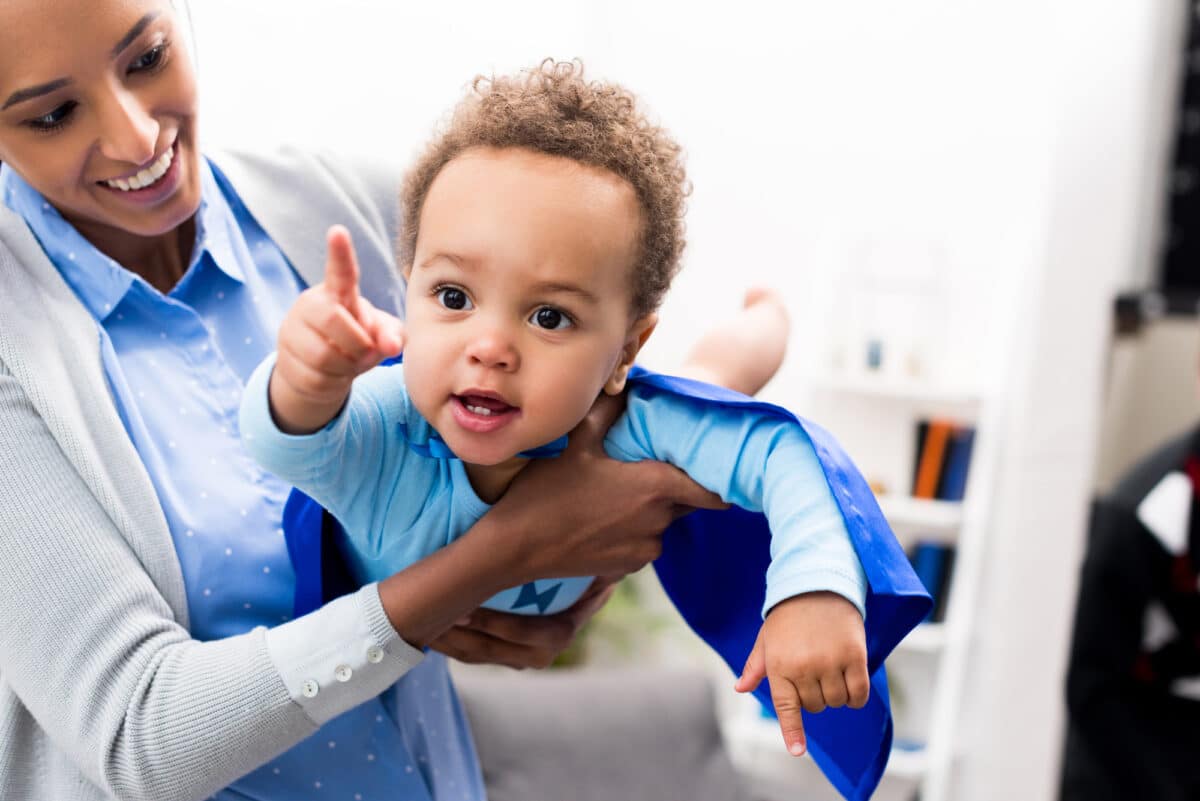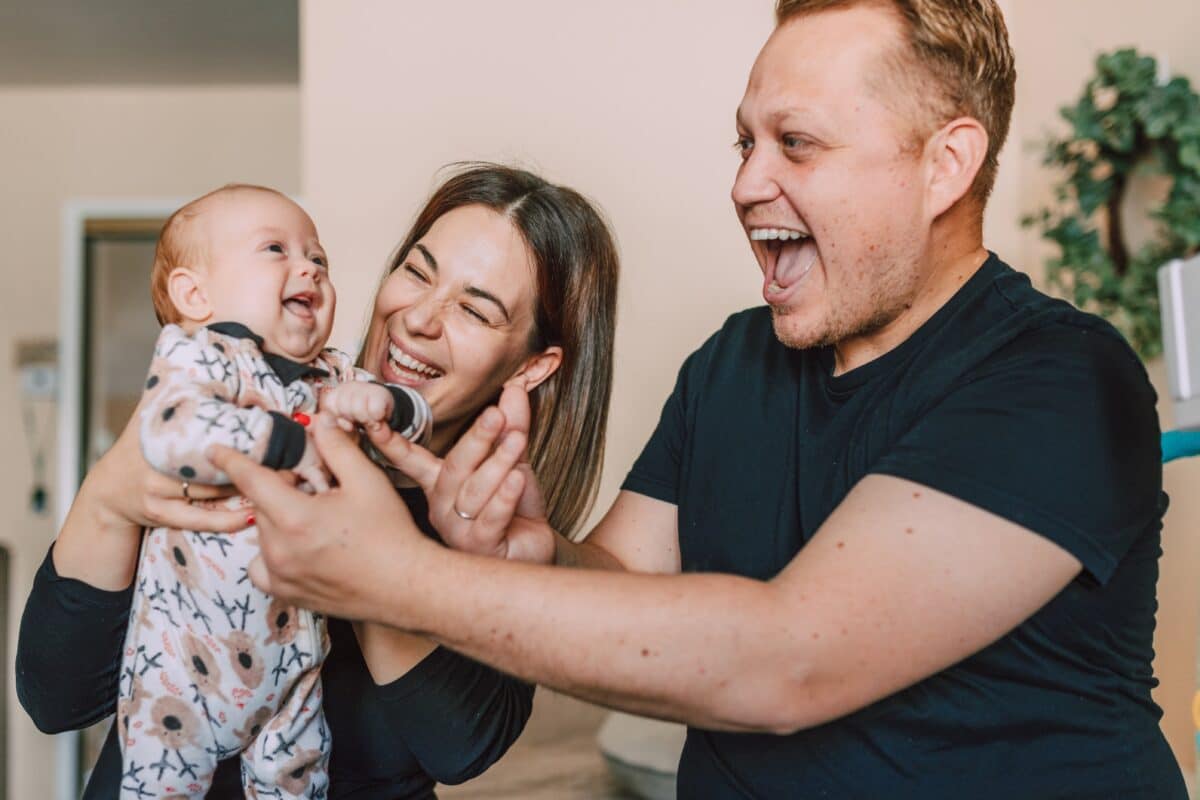When Do Babies Start Talking?

Those coos and gurgles are cute, but you can’t always understand them.
When do babies start talking?
From the time they’re born (and even before!) we look forward to seeing our babies take on the world. From crawling to walking and babbling to talking, so much happens to babies in the first few years of life!
All babies are different, but there are certain guidelines the CDC puts out so that parents can make sure their babies are on track. One major milestone is when your baby (finally!) starts talking.
Read on to find out when babies start talking, what talking actually means (hint: it’s not words), and what you should do if your baby seems to be experiencing a speech delay.
When Do Babies Begin Learning Language?
You might be surprised to find out that learning begins before birth.
Once a fetus is 18 weeks, they can hear blood flow and your heartbeat. Around 27-29 weeks, they can hear sounds outside the womb. During this time, they are beginning to recognize the voices closest to them and can even become startled by loud noises!
You can even begin reading to your baby at this stage. They may not be learning words yet but they will be learning language, infliction, tone, and be comforted by your voice.
When Do Babies Start Talking?
Talking is any intentional communication that a baby makes. Communication ranges from sounds to words and everything in between. You won’t hear full fledged conversations usually until about three years old.
Newborn
Newborns will get their point across in any way they can. They cry, grimace, smile (around 6-8 weeks), and move their bodies to communicate.
6-8 Weeks
Besides their first smile to communicate happiness, they will also begin cooing. Cooing is the first time (besides crying) that they will be making noises to express themselves. Most parents are surprised to learn that this is their first attempt at exercising their new found language skills!
6 Months
Babies will begin to mimic the sounds they’ve been hearing. You may hear da-da, ma-ma or other consonant sounds that they string together. But don’t get too excited yet, although they sound like real words, babies are just beginning their language journey and these sounds have no real meaning (sorry to burst your bubble!).
9 Months
At 9 months, babies say their first word and actually know what it means.
Your baby may know some simple words like “bye bye” and “no” and you may hear some infliction in their tone. For example, it will be obvious that, when your baby says “no,” they really mean it! And even though they are only learning one new word here and there, they are really beginning to pick up language skills.
12 Months
This is an exciting time for babies and parents because this is when babies really begin learning to talk.
Around 12 months your baby can say “mama” and “dada.” (And know what these words mean!). They may also know some other simple words. S/he can also follow short commands. (Try a one-step direction like, “Pick up the ball.”) At this stage, babies understand more words than they say, so keep talking to them.
18 Months
Around 18 months your baby should be able to point to some objects when asked or point to objects themselves and name them. This is also when you may begin to recognize speech delays or symptoms of autism spectrum disorder. But don’t fret. All babies learn at different paces and there’s no reason to worry just yet. If you notice a lack of eye contact, difficulty following simple commands, or gesturing instead of vocalizing, book an appointment with your pediatrician.
2 Years
Your little cutie is beginning to string together words now (“bye bye, daddy” or “want water”). This is a huge leap from just a few months ago where s/he would cry because they were trying to communicate and you couldn’t understand them.
While we can’t tell you that the terrible twos are easy, at least communicating is making those outbursts a little easier.
3 Years
By this time, your little one is having a language explosion. They are able to think (and therefore speak) abstractly. From here on out, instead of wishing they’d speak, you may be wishing the opposite.
Helping Your Child’s Verbal Skills
Read
Reading to your baby is the very best thing you can do to help your baby learn to talk and reading helps them improve their vocabulary and language skills.
When you’re reading, not only do they hear the different tones in your voice, but you can take the opportunity to point to objects in a book to name them. (“Look, a ball! Look at the blue car! This is a red apple.”)
You can also elaborate and count things on a page.
Talk
This one seems obvious, but talking to your baby can teach them to talk.
Tell them everything you’re doing. “Mommy is brushing her teeth now. Look at my yellow toothbrush!” Or “Mommy is getting your milk now. I am opening the refrigerator. See how cold it is? It keeps your milk fresh.”
It might sound silly but trust us, your baby is absorbing everything you say.
Correct Your Baby
You’re not aiming for perfection here, and you don’t need to worry about doing this 100% of the time.
If they are trying to say grandma and end up with “gamma,” don’t be afraid to help them enunciate. Model how to say each syllable and trust that they are absorbing the lesson.
Praise Them
Even if they get something wrong, make sure you’re giving them positive affirmations. Letting them know that they are doing a great job trying to communicate will encourage them to keep trying.
Sing Songs
The brain retains more information if it’s incorporated into song. That’s why so many educational programs include singing. So while your baby may not know what they are saying, if they can sing their ABCs they are definitely learning to enunciate their words.
Don’t Talk Over Your Baby
Try not to answer for your baby or talk over him/her. This will just discourage them from speaking or worse, lead them to regression because they know mom or dad (or their siblings!) will do anything they need without words.
When Should I Be Worried?
All babies develop at different rates. Even twins will not meet every milestone at the exact same time. (Einstein didn’t start talking until he was four!)
However, if you notice that your child doesn’t seem to be following the CDC guidelines, your pediatrician is an optimal source to speak with about your concerns, as they are familiar with you and your baby. They can look at the chart and see any patterns or regressions your baby may be experiencing. And if there’s nothing to worry about, your pediatrician can also put your mind at ease.
The good news is that, even if your baby seems to be speech delayed, there are options like early intervention that can get your baby back on track!
Conclusion
As you can see, there is no clear answer to the question, “When do babies start talking?” Every baby will develop differently and that’s okay. The guidelines for when your baby should be communicating are just that—guidelines. They aren’t set in stone.
If you have any concerns, talk to your pediatrician. As always, we are here to help. Please call us for your appointment and we can assess your baby’s needs.
Kid Care Pediatrics
Kid Care Pediatrics has been in existence since October 2001. It was established by Omar A. Gomez, M.D. The practice philosophy at Kid Care Pediatrics is to provide quality pediatric medical care for children in a professional yet caring manner.



